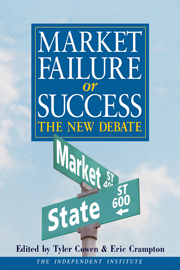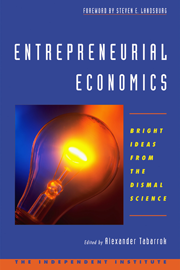With the growth of the Internet has come a lot of talk about privacy. In a recent cover story in The Economist, “The End of Privacy,” the magazine warned that “threats to traditional notions of privacy will proliferate.” It cites a survey showing that 80 percent of Americans worry about what happens to information collected about them.
The current debate over Internet privacy seems to prove that no blessing is without its detractors. Public issues should be built on systemic patterns of actual human troubles. In privacy skirmishes the only actual infringements ever cited are isolated or ephemeral. When the automobile became a widespread consumer product, did people fret over having something that could be broken into? They installed locks and eventually alarms, built garages and secure parking lots with fences and gates, and watched over them with video cameras. The need to secure their cars may have raised new problems for law enforcement, but certainly did not justify new regulation of the automobile industry or the security industry.
The average citizen does not find it worthwhile to inform himself about an issue when he can’t affect policy. A pollster, it has been said, is someone who asks citizens what they think about something they don’t think about. We can understand how the average survey respondent might fret over privacy as a way of flattering himself. We like to think we are so important that others want to talk about us.
That troubles of privacy and trustworthiness on the Net have not proven significant should not surprise us. In free markets consumers reward producers only when all their concerns are met. Profits go to the producers who are trustworthy and responsible, except in fleeting and atypical circumstances.
Suppose the consumer wants a reliable watch. That want carries with it several ancillary wants: The consumer wants to know where the watch is available; he wants to determine the claims made for the watch; he wants assurance that the claims can be trusted; he wants convenience in completing the purchase; he may want discreetness in how information about the purchase is used. The bundle of wants must all be addressed if the producer is to win the consumer’s patronage and make a profit.
What are supermarkets, shopping malls, and established retailers if not ways of providing the ancillaries while relying on wholesalers for the primary want? The shopping mall gives the consumer free parking, security, pleasant surroundings, and brand-name assurance. The supermarket too is really an immense fair where hundreds of manufacturers sell their goods. Such places that serve both the primary and ancillary wants may be called marketplaces.
Each marketplace has to compete with other marketplaces. Safeway competes with Lucky’s and to some extent with 7-Eleven. There is a whole field of marketplaces competing for consumers’ dollars. It’s really a market for marketplaces. The important point is that to succeed in the market for market places, a marketplace must meet all the consumers’ wants, not just the primary want.
Another type of marketplace is the Web site. Web sites also compete in the market for marketplaces. This manner of speaking may be confusing, but it underscores that assurance and privacy are just other things that consumers demand. Just as the demand for watches creates opportunities for entrepreneurs to profit by providing watches, the demand for assurance and privacy creates opportunities for entrepreneurs to profit by providing assurance and privacy. There is no more reason for government to regulate the production of those things than there is for it to regulate the production of watches.
Researchers have explored how producers provide assurance of quality and safety. The central mechanism is reputation, the general opinion of whether one’s promises of quality and safety are trustworthy. Producers build reputation by a variety of means.
Firms seek repeat dealings so that satisfied customers gain confidence and return for more purchases. If the producer were to cheat customers, he would lose future purchases not only by that customer but also by others informed of the dissatisfying experience. Firms develop an array of services brought under the umbrella of brand names, logos, and trademarks, using their reputation to assure quality and safety.
Retailers build bridges of trust by becoming regular dealers between producers and consumers. Rite Aid and Safeway have a continuing relationship with pharmaceutical suppliers on one side and consumers on the other. Buying from a trusted middleman, like Safeway, assures the customer of quality and safety in goods from a supplier once removed. By serving as a middleman, Safeway makes the consumer’s relationship with the ultimate manufacturer like the relationship we have with the friend of a friend.
Firms also seek seals of approval awarded by various organizations that evaluate quality and safety. Classic examples include Underwriters Laboratories, Moody’s, AAA, and the Orthodox Union. Some evaluators work on the other side of the market. Consumers themselves turn to Consumer Reports, Zagat’s, movie reviews, doctors, and so on to gain assurance of quality and safety.
The Overlooked Market
Nothing here should be startling. But a careful study of that intangible good, assurance, shows that the voluntary sector of society has developed many seemingly disparate ways of providing it. Unfamiliarity with these practices often leads people to overlook them altogether and to suppose that the only source of assurance is the tort system and government regulation. Scholarly research indicates that, in day-in-and-day-out commerce, the voluntary approach is by far the most important, and that tort and regulation are a distant second and third.
Traditional practices are of course extended to the Net. What is TRUSTe.org but a seal-of-approval organization paid to evaluate privacy policy and certify deserving Web sites to assure customers of responsible use of information? The auction site eBay is a complex approval giver: it registers users, manages interaction, insures some purchases, and certifies escrow providers for other purchases. Amazon is a giant middleman. Because we trust Amazon, we have a bridge to every smalltime publisher in its listing. Infomediaries might convert the ancillary want into the primary want and act as information handlers for consumers. There is no definitive method or approach to assurance and privacy, nor should there be. But we may predict that there will be remedies to the problems that trouble consumers enough that they are willing to pay to avoid them.
Experience in traditional markets offers other lessons for the Net. It should teach us the mischief that government regulation creates in the name of assuring quality and safety. Regulations like occupational licensing and those imposed by the Food and Drug Administration and Occupational Safety and Health Administration, despite what legitimacy they may have with citizens and journalists, are a bane to all Americans. Scholarly research, especially by economists, clearly concludes that these regulations do more harm than good. The FDA is probably the worst. To illustrate this point I have gathered quotations from 13 economists who study the FDA and believe FDA power should be scaled back. I am not aware of any published defense or justification of the FDA by an economist—and I have gone looking for one.
Let us also learn from traditional markets something about supposed privacy violations. Some activists have attacked the credit-reporting industry for making up marketing lists. Actually, consumers’ credit information is not disclosed to marketers. The marketers usually do not even see the list; instead, a third-party fulfillment house sees it and remains perfectly discreet. The privacy “violation” decried so indignantly amounts to nothing more than the nuisances of receiving junk mail. The issue is thus insignificant. Besides, mail is really a mailbox problem, which persists because the mailbox and delivery are not handled by free enterprise. The U.S. Postal Service fails to give customers the option of refusing unsolicited commercial mail at the most logical and convenient point: the point of delivery. It is unlikely that free-market mail delivery would continue to waste resources and the customers’ time delivering unsolicited, unwanted commercial mail.
Finally, a note on the term “privacy.” The prevalence of that term in these matters is unfortunate. In so many cases where it is used the issue would be more aptly discussed as one of confidentiality in transactions or in information shared in completing a transaction. Confidentiality is more clearly understood as a matter of agreement and understanding. That is what most of the Internet issues are really about.











